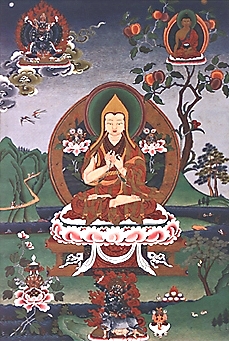 日期:2012/02/22 NPO 喇嘛網 編輯部
日期:2012/02/22 NPO 喇嘛網 編輯部

Je Tsongkhapa
Je Tsongkhapa
From Wikipedia, the free encyclopedia

Je Tsongkhapa (Tsong-kha-pa) in the fifth vision of Khedrub Jey (mkhas ’grub)
Tsongkhapa (1357–1419), whose name means “The Man from Onion Valley”, was a famous teacher of Tibetan Buddhism whose activities led to the formation of the Geluk school. He is also known by his ordained name Lobsang Drakpa (blo bzang grags pa) or simply as Je Rinpoche (rje rin po che).
Tsongkhapa heard Buddha’s teachings from masters of all Tibetan Buddhist traditions, and received lineages transmitted in the major schools.[1]
His main source of inspiration was the Kadampa tradition, the legacy of Atiśa. Based on Tsongkhapa’s teaching, the two distinguishing characteristics of the Gelug tradition are:
- The union of Sutra and Tantra, and
- The emphasis on Vinaya (the moral code of discipline)
Je Tsongkhapa - Wikipedia, the free encyclopedia
A Short Biography of Tsongkhapa
Tag Archives: Tsong
Category Archives: Tsong Khapa
Tsongkhapa (Stanford Encyclopedia of Philosophy)
Tsongkhapa
First published Mon Jul 18, 2011
Tsongkhapa (1357–1419) is a well-known Tibetan religious philosopher. In his iconic form, wearing a tall yellow hat, he is the center of the Gelugpa (Tib. dge lugs pa) sect that ruled Tibet until the Chinese takeover in 1951, and whose de facto leader is the Dalai Lama. Tsongkhapa has been the subject of poor, misleading scholarship — particularly in the 19th century when so-called “Orientalist” scholars (e.g., Monier-Williams, 1888: 268, 277) falsely imagined him as a “reformer” who founded, or rediscovered, the rational and ethical school of original Buddhism.
The historical Tsongkhapa flourished in the period immediately following the final redaction of the Buddhist canon in Tibetan translation (Tib. bKa' 'gyur, pronounced Kanjur). He presents a Middle Way (Sk. madhyamaka, Tib. dbu ma pa) philosophy, based on the works of the Indian philosopher Nāgārjuna (third-fourth century), and strongly influenced by the Indo-Tibetan Buddhist logico-epistemological tradition (Sk. pramāṇa, Tib. tshad ma) founded by the Indian epistemologists Dignāga and Dharmakīrti (fifth to seventh century). In it he strikes a balance between knowledge and praxis. He unerringly characterizes all statements about ultimate truths (Sk. paramārtha-satya) framed in positive terms as false, but develops a hermeneutics to retain the authority of correct moral statements on a covering (Sk. saṃvṛti) or conventional (Sk. vyavahāra) level. His most influential writing reconciles the philosophy of emptiness (Sk. śūnyatā) with the imperative of praxis embodied in a universal altruistic principle (Sk. bodhicitta). He gives pride of place to apparently antinomian tantric praxis without devaluing the centrality of ordinary moral life, and develops a distinctive analysis of dependent origination (Sk. pratītya-samutpāda).
 |
主持人 |
陳俊吉
|
|
 |
聯絡電話 |
+00886 982678253
|
|